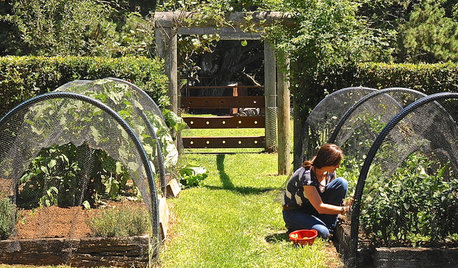Questionable Tomatoes
janisj
14 years ago
Related Stories

EDIBLE GARDENSSummer Crops: How to Grow Tomatoes
Plant tomato seedlings in spring for one of the best tastes of summer, fresh from your backyard
Full Story
COLOR10 Reasons to Make a Splash With Tomato Red
You won’t duck at these tomatoes. See how bold red shades can play up architecture, light up a dark spot and add drama
Full Story
KITCHEN DESIGN9 Questions to Ask When Planning a Kitchen Pantry
Avoid blunders and get the storage space and layout you need by asking these questions before you begin
Full Story
FARM YOUR YARDHouzz Call: Home Farmers, Show Us Your Edible Gardens
We want to see where your tomatoes, summer squashes and beautiful berries are growing this summer
Full Story
EDIBLE GARDENSGarden BFFs? Why Your Vegetables Are Begging for Companion Plants
Foster friendships among plants for protection from pests, pollination support and color camaraderie
Full Story
FARM YOUR YARDHow to Build a Raised Bed for Your Veggies and Plants
Whether you’re farming your parking strip or beautifying your backyard, a planting box you make yourself can come in mighty handy
Full Story
EDIBLE GARDENSA Formerly Weedy Lot Now Brims With Edibles and Honeybees
Photographers transform their barren backyard into an oasis filled with fruit, vegetables, honey, eggs and more
Full Story
GARDENING GUIDESEssential Watering Tips for Your Edible Garden
To give your edible plants just what they need, check out these guidelines for how, when and how much to water
Full Story
KITCHEN DESIGN12 Farmhouse Touches That Bring Homeyness to a Kitchen
Shaker cabinetry, country-store-inspired hardware, barn elements or a key piece of art will add homestead appeal to your kitchen
Full Story
REGIONAL GARDEN GUIDESCalifornia Gardener's March Checklist
Give natives and tropicals a well-deserved spotlight — plus, discover an easy herb that keeps on giving
Full Story





Linda_Lou
ksrogers
Related Professionals
Canton Landscape Architects & Landscape Designers · San Juan Landscape Architects & Landscape Designers · Elgin Landscape Contractors · Hartford Landscape Contractors · Lakeland Landscape Contractors · East Lake-Orient Park Landscape Contractors · El Mirage Landscape Contractors · Estelle Landscape Contractors · Euclid Landscape Contractors · Franklin Landscape Contractors · Southbury Landscape Contractors · San Pablo Landscape Contractors · Anderson Roofing & Gutters · Rockville Roofing & Gutters · Campbell Driveway Installation & Maintenancedigdirt2
gardener1908
calliope
digdirt2
alfie_md6
ksrogers
joepyeweed
sara_the_brit_z6_ct
annie1992
lazy_gardens
lazy_gardens
janisjOriginal Author
Linda_Lou
alfie_md6
greenwood85
Linda_Lou
James McNulty
madmagic
Linda_Lou
ksrogers
annie1992
ccaggiano
ksrogers
ksrogers